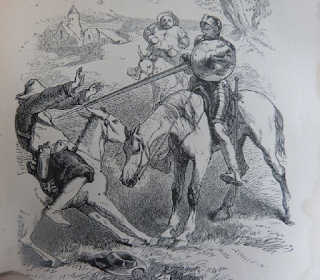2016 - a year of literary celebration
2016 is a bumper year for literary anniversaries. From the deaths of Cervantes and Shakespeare 400 years ago to the publication of Truman Capote´s In Cold Blood and Jean Rhys's Wide Sargasso Sea 50 years ago, there is a lot to celebrate and commemorate.
I have selected a few of my favourites to delve into.

This week, I question why Cervantes is not as celebrated as Shakespeare despite being considered a literary great by many writers. He is, after all, the father of the modern novel. All over the world, Shakespeare is being loudly celebrated; the celebration of Cervantes is somewhat muted.

Charlotte Brönte was born 200 years ago. In May, I shall look consider her life and works, and the way she reflected women in society.

In June 1816, Mary Shelley (Godwin as she was then) began writing Frankenstein after a night of ghost stories at a wet lake Geneva. In my humble opinion, Frankenstein is one of the best novels ever written, and which certainly stands the test of time. In June, I'll look at the ways in which the story has been adapted for the screen and just how far these have strayed from the original work.
My childhood reading was dominated by Enid Blyton, but my very early reading years were filled with stories of Peter Rabbit. July is the 150th anniversary of Beatrix Potter's birth and in September a recently discovered new Potter story will be published. Sadly, Potter did not complete all the drawings so these are going to be supplied by Quentin Blake of Roald Dahl fame. I'll look into whether Potter's books still appeal to the younger generation, or whether this will be for those of us reminiscing about our own childhoods.
In August I shall be physically following a literary trail - either to Romania and Castle Brasov for a Dracula fix, or Castille-La Mancha for some windmill tilting - but service will resume in September with another childhood favourite, Winnie-the-Pooh. Pooh was first published 90 years ago and the 'bear of little brain' has remained popular ever since. The question is: Is it possible to live according to the wisdom of Pooh?

October 1966 saw the publication of Wide Sargasso Sea, a prequel to Jane Eyre, by Jean Rhys. Providing a back-story for the mad woman in the attic, Rhys drew on her own Creole history to write a brilliantly insightful novel that stands well outside the shadow of Jane Eyre. So, how has the depiction of madwomen changed over the centuries?
I'll end my retrospective with a look at Truman Capote's In Cold Blood, a book that divided opinion when it was published 50 years ago. The town in which the true story is based is still trying to forget the events that gave it its notoriety. Should true crime be given the star treatment, or does writing about it give the perpetrators the status and attention they crave?
I have selected a few of my favourites to delve into.

This week, I question why Cervantes is not as celebrated as Shakespeare despite being considered a literary great by many writers. He is, after all, the father of the modern novel. All over the world, Shakespeare is being loudly celebrated; the celebration of Cervantes is somewhat muted.

Charlotte Brönte was born 200 years ago. In May, I shall look consider her life and works, and the way she reflected women in society.

In June 1816, Mary Shelley (Godwin as she was then) began writing Frankenstein after a night of ghost stories at a wet lake Geneva. In my humble opinion, Frankenstein is one of the best novels ever written, and which certainly stands the test of time. In June, I'll look at the ways in which the story has been adapted for the screen and just how far these have strayed from the original work.
My childhood reading was dominated by Enid Blyton, but my very early reading years were filled with stories of Peter Rabbit. July is the 150th anniversary of Beatrix Potter's birth and in September a recently discovered new Potter story will be published. Sadly, Potter did not complete all the drawings so these are going to be supplied by Quentin Blake of Roald Dahl fame. I'll look into whether Potter's books still appeal to the younger generation, or whether this will be for those of us reminiscing about our own childhoods.
In August I shall be physically following a literary trail - either to Romania and Castle Brasov for a Dracula fix, or Castille-La Mancha for some windmill tilting - but service will resume in September with another childhood favourite, Winnie-the-Pooh. Pooh was first published 90 years ago and the 'bear of little brain' has remained popular ever since. The question is: Is it possible to live according to the wisdom of Pooh?

October 1966 saw the publication of Wide Sargasso Sea, a prequel to Jane Eyre, by Jean Rhys. Providing a back-story for the mad woman in the attic, Rhys drew on her own Creole history to write a brilliantly insightful novel that stands well outside the shadow of Jane Eyre. So, how has the depiction of madwomen changed over the centuries?
I'll end my retrospective with a look at Truman Capote's In Cold Blood, a book that divided opinion when it was published 50 years ago. The town in which the true story is based is still trying to forget the events that gave it its notoriety. Should true crime be given the star treatment, or does writing about it give the perpetrators the status and attention they crave?




Comments
Post a Comment